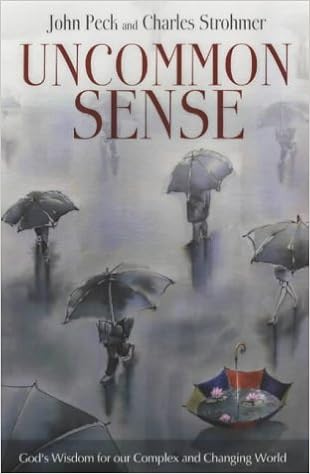“For the task [of] developing an authentic biblical wisdom among the people of God in this generation, we need in particular two kinds of Christians in our churches. One kind will be what rather hesitantly we might call the experts, those called to work in a particular area of life. It may be what they do for a livelihood, and often it is. But in this rather odd fallen world it may be a spare time activity. These people develop expertise by a certain degree of concentration and specialization. They are likely to be experts in only one field, and so in other respects they will be no better off than the rest of us. They tend either to become leaders and spokespersons in particular aspects of life or to provide resources for leaders and spokespersons.
“Besides the experts, we need the intelligent amateurs. These people are ordinary, average Christians who pursue their own callings but who also seek to understand the world around them as far as God grants them resources, abilities, and opportunities. They won’t be experts, but then they won’t speak like that, either. Most of the time they won’t be on platforms or in pulpits or writing authoritative books. This does not mean that they will be silently submissive or inert.
“They will do all sorts of study as their interests lead them, and they will be able to talk clearly, to listen intelligently, to make worthwhile contributions in discussions, and to have opinions worth accepting or disputing. Any of which may lead to discoveries. When they see a call to action, they soberly commit themselves to it. Above all, they know how to ask good questions. Such people are indispensable for creating a climate in which wise leadership can flourish. They may volunteer for community projects, or join education committees, or become precinct delegates, or even deacons and elders.
“The experts need the intelligent amateurs. This above all the expert needs. The worst possible thing is for the experts to go unchallenged. We suffer at present far too much from the tyranny of the expert. Not only does the expert tend to have an inadequately challenged authority in his own area of competence, but he also gets to be listened to with reverence in areas in which he is not competent. So rock stars are interviewed to pronounce on social ethics, physicists pontificate on the meaning of history, and politicians seem expert about everything! The only people who are expected not to address the world (though within the church the situation is different) outside their competence are religious leaders. (We wonder why?)
“Further, constant work within one’s own discipline easily leads the expert to become unaware of significant questions from outside that are vital for that work. Any teacher worth her salt knows, possibly more than she cares to admit, that her thinking and understanding has developed best in response to intelligent questioning, especially the sort that rocks her on her heels and makes her rethink some position.
“The intelligent amateur has a special power of discrimination. This is invaluable. Paul prays for those engagingly loving Christians at Philippi that their love would abound in thorough knowledge and insight, so as to discriminate the best from the rest (Philippians 1:9–10). Experts, curiously enough, are not the best endowed with this ability – maybe they are too busy studying the trees to appreciate the forest and the surrounding countryside.
“None of us can fulfill our callings as well as we might without a supporting community, and the experts are no exception. Other things being equal, a community like the church is going to have teachers and leaders whose quality is chiefly determined by the acumen of its general membership. If the members are suckers, they will be led by fools or rogues and hardly suspect it.
“If we hope to witness Christianly to this age in the Name of the Lord and in the interests of a more obedient culture, it is essential that as a Christian community we do good work in this area. A doctor will tell you that half her task is about good diagnosis, and half of that is about good observation and analysis. Careless work or arrogantly superficial efforts are going to be disastrous on the part of people who think that they are automatically experts because they know the Bible text or have a degree in sociology.
“It would be easy to give up. We may not be experts, and we may not have the time or the talents to embark on taxing programs of study. We may not be used to such demands being required of our intellectual life to become intelligent amateurs. And maybe our background has taught us to believe that our answers must always be simple, so that “he who runs may read” the message.
“Certainly there is a simplicity in the Gospel. To meet Jesus and trust him is the most natural thing in the world for a child. But living faithfully as an adult in a complex world is not simple. We are not expected to think like geniuses (unless we are one), but each of us is expected to think as hard as we can and to make what contributions we can to the ministry of the whole body of Christ in its witness, teaching, preaching, healing, and persuading. We must all do our part in this, as service to God in the world according to our particular gifts and callings. And we may need to be prepared to double up for others who have stopped functioning.” (Uncommon Sense: God’s Wisdom for Our Complex and Changing World, S.P.C.K, 2000; cpt 15.)
©2021 by Charles Strohmer














